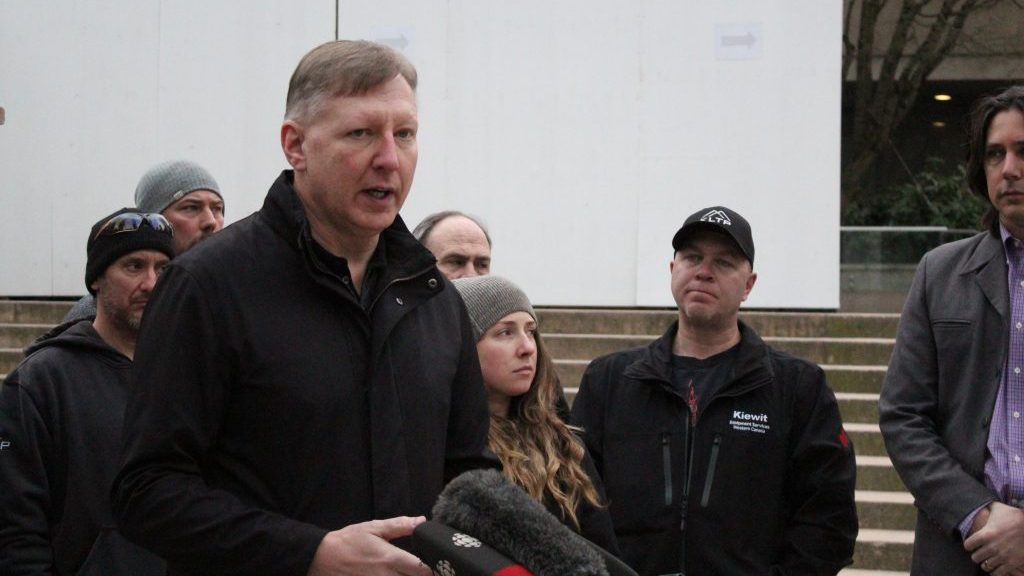Several construction industry stakeholders are taking their opposition to community benefits agreements (CBAs) to the Supreme Court of B.C.
A coalition of construction associations have filed a lawsuit in B.C. Supreme Court to have the NDP government’s project labour framework struck down.
The group includes the Independent Contractors and Businesses Association (ICBA), the British Columbia Construction Association, the Vancouver Regional Construction Association, the Progressive Contractors Association of Canada (PCA), the Canada West Union and the Christian Labour Association of Canada (CLAC). They have joined up with the B.C. Chamber of Commerce, the Canadian Federation of Independent Business (CFIB) and several construction companies, professionals and workers.
The CBA framework establishes the B.C. Infrastructure Benefits Board (BCIB), which will manage employment on major government projects such as the Pattullo Bridge, the Trans-Canada Highway near Kamloops, the upcoming Broadway light rail transit line to the University of British Columbia and may be used with future projects. Under the framework, anyone can bid on a project, but workers must join the Allied Infrastructure and Related Construction Council of BC, a conglomerate of building trades unions, within 30 days of starting work on a CBA project.
ICBA president Chris Gardner, VRCA president Fiona Famulak and CLAC B.C. manager of government relations Ryan Bruce all attended a press conference before entering the Law Courts Building where they expressed their opposition to the framework.
“We’re here today at the B.C. Supreme Court to challenge the government’s discriminatory policy designed to give the building trade unions, who represent a mere 15 per cent of the workforce, a monopoly on all public projects,” Bruce said.
“This policy strips workers of their rights to not only choose if they want to belong to a union but also forces them to belong to a union chosen by Premier (John) Horgan.”
CLAC believes the right to choose a union is a constitutional right protected under freedom of association.
“By imposing this policy, he (Horgan) is telling British Columbians that he knows better than them when it comes to the unions that should represent them,” Bruce said.
Gardner said the coalition has come to the B.C. Supreme Court to send a message to the government.

“Simply put, this policy is one of the most offensive to come out of Victoria in the last 50 years. This new policy will freeze out 85 per cent of the men and women in construction in British Columbia,” Gardner said.
He also pointed to a lack of dialogue and consultation prior to the implementation of the policy and questioned the judgement of CBAs in a time when “construction is the busiest it’s been in decades.”
“The number one challenge facing the construction market right now is a shortage of workers. So when the government says they’ll only use 15 per cent of workers to build the Pattullo Bridge, that means construction workers will lose out, taxpayers will pay more and British Columbians will get a project that isn’t being developed in the most efficient way possible,” he said.
Not all construction stakeholders agree with the anti-CBA coalition. In an interview with the Journal of Commerce, BC Building Trades executive director Tom Sigurdson voiced his support for the labour framework.
“Owners of construction projects get to place certain rules and conditions on those projects, and the government has decided they want more apprentices, more Indigenous people and more women on projects and want British Columbians first in line for projects taxpayers and hydro ratepayers are paying for,” he said.
“The government is putting their money where their mouth is. B.C. governments have always supported post-secondary trades training, but not employment once training is done.”
Sigurdson also said the ICBA have taken on the role of a “political operative” in B.C.
“They’re probably more effective at being the opposition in B.C. even though the Liberal party has the role of the official opposition,” he said.
In the courtroom, Allied Infrastructure and Related Construction Council of BC lawyer Charles Gordon advocated for the unions and argued not against the claims in the coalition lawsuit specifically but that those claims should not be in the B.C. Supreme Court but rather considered by the Labour Relations Board.
BCIB is directing employees and has a collective agreement. If successful, “bidders will obtain work from the BCIB and work guided by that collective agreement,” he said.
“This has the effect that this will be a union project, and if there’s an argument against that, including involving the Charter of Rights and Freedoms, in substance it is a labour relations issue,” Gordon said.
Gardner took issue with the government’s premise that the lawsuit should be reviewed by the Labour Relations Board.
“We’re not challenging the collective agreement, we’re challenging the policy of the provincial government,” Gardner said.
“This is just an effort by the government to delay a hearing on the matter. We should be hearing this matter right now, as billions of dollars are at stake and the court is an appropriate venue.”
Gardner also expressed optimism the court would agree with the coalition’s point of view.
“We’re hoping the courts agree with us and we can move forward past procedural issues and have the courts listen to us,” he said.
In an interview held before the lawsuit was filed, PCA president Paul de Jong echoed Gardner’s concerns.
“We’re concerned about the court staying true to the path of the claim,” de Jong said. “That’s our goal going into preliminary hearings, to ensure the case goes forward with no delays or wrong turns.
“This is a matter for the courts and for the broader public to hear and understand. It’s a genuine policy and legal question about the rights of workers as interpreted in the Canadian Charter of Rights and Freedoms.”
Sigurdson sided with the Allied Infrastructure and Related Construction Council of BC position.
“Our perspective is that this is a labour matter, about labour procurement and how the government procures labour for the project they want to build,” he said.
Sigurdson used the Pattullo Bridge project as an example of the value of the labour framework.
“The last time the training co-ordinator did a count, there are 315 apprentices in the ironworking trade, and 297 in Ironworkers Local 97. The only pile driving school is through the pile driving union. I would hazard a guess the Pattullo Bridge will need piles driven and ironworkers will have a significant role on the project. This is also about security of supply,” Sigurdson said.
As of press deadline no court decision had been made.











ICBA is anti everything. What is their strategy for hiring local workers including women and First Nations? Why doesn’t CLAC mention that in order to work on the Port Mann bridge, the workers were forced to join CLAC and pay their dues?